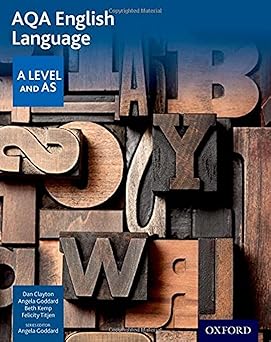King Henry V, who was known for his military strategy, ability to inspire troops and build morale, led the English side.
Studying English Language
Interested in how the English language has developed, how it is used and how it’s represented? An A level in English will teach you all about the world’s pre-eminent language, giving you interesting and important insights and skills that will help you across a range of subjects, as well as giving you an excellent basis of knowledge from which to pursue further study at university.
English Language A level
£14.99 / month
How does a course work?
Step 1 – Subscribe to our online course materials
Subscribe to the courses you wish to study. Each course contains everything you require to succeed in your chosen subject, including detailed coverage of all required topics, activities, self-assessment questions and assignments with comprehensive suggested answers. You may choose to have the assignments marked by one of our fully-qualified tutors.
The minimum subscription period is 6 months. After that, you can cancel your subscription at any time. If you wish, you may optionally purchase a printed, spiral-bound course pack at the point of subscription.
Step 2 – Taking control of your studies
You will be allocated a tutor from our bank of PGCE-qualified tutors. Your tutor will arrange a free 15-minute induction call with you to introduce themselves and the course to you. As you require further tutor support, you can purchase:
- Tutorial time, one-to-one in our virtual classroom
- Assignment marking
- Mock Exam marking
Course Outline
The course offers a great opportunity to learn more about the English language and its application. At AS level, you’ll learn about how to analyse language correctly, you will look at textual variations and representations, diversity within the ‘family’ of English languages, regional and national variations and different language discourses.
In the second year of the course, you’ll delve deeper into the English language, understanding how children develop their language, analysing speech and writing with language development theories and understanding how language evolves through time. You’ll also understand more about how language is used in action in a variety of situations and texts.
This course includes 40 Lessons and 20 Tutor-marked assignments, detailed guidance on preparing your NEA/coursework and 2 Mock Examination papers.
Module One: Introduction to Language Analysis: Language Frameworks
- Modes of address: Lexis and Semantics
- Modes of address: Grammar and Graphology
- Modes of address: Analysing spontaneous speech
- Modes of address: Pragmatics and discourse
Module Two: Textual Variations and Representations
- Variations in spoken, written and multi-modal texts
- Representations -Texts in Time
- Representations – Texts in Context
- Language, Power and Identity
Module Three: Language Diversity
- Sociolects – Social and Occupational groups
- Sociolects – gender and ethnicity
- Accents and Dialects – Regional varieties
- Global English – National and International varieties
Module Four: Language Discourses
- ‘Standard English’: Caxton’s Eggs and historical attitudes
- Attitudes to diversity and change – constructing identity
- Attitudes to diversity and change – positioning and influencing the reader
- Attitudes to diversity and change – future discourses
Module Five: Language in Action: Investigating Language
- Identifying an investigation topic/ research questions
- Methodology: Data collection and language analysis
- Evaluating findings
- Language concepts and writing up
Module Six: Understanding Children’s Language Development
- Functions of Children’s Language Use
- Language Development: Phonology and Grammar
- Language Development: Lexis, Semantics and Pragmatics
- Comparing development in spoken and written texts
Module Seven: Applying Theories of Language Development to Analysis of
Speech and Writing
- Genres of children’s speech and writing
- Modes of communication – spoken, written and multi-modal texts
- Theories of Children’s Language Development
- Researching Children’s Language Use
Module Eight: Language in Action – Original Writing
- Original Writing Option 1 – The Power of Persuasion
- Original Writing Option 2 – The Power of Storytelling
- Original Writing Option 3 – The Power of Information
- Producing an Evaluative commentary
Module Nine: Introduction to Language Change
- Diachronic Change and Diversity: Language use from 1600 to present day
- Processes of Diachronic Change
- Synchronic Change and Diversity: The future of English?
- Evaluating language change in written texts and transcripts
Module Ten: Evaluating Language Change
- Using language data to evaluate diachronic change
- Using language data to evaluate synchronic change
- Synchronic Diversity: Ethnolects and International English
- Attitudes to language change: Descriptive models. Directed Writing
Examinations
Oxford Open Learning’s English A level course has been specifically written to prepare candidates for the AQA English A level qualification. The syllabus numbers are:
- AS English (Advanced Subsidiary GCE in English): course code 7701
- A-level English (Advanced GCE in English): course code 7702.
For the AS course, there are two 90-minute exams June, while the A Level course, assessed in June, comprises two exams (each two hours and 30 minutes long) and one piece of NEA (coursework) – the Language Investigation.
In order to do the Language Investigation, you will need to be able to follow the rules for authentication.
.Course duration and study time
The Recommended number of study hours for this course is 200 hours. You will need to fit all of this in
Because of the unique way Oxford Home Schooling courses are structured your support will last for as long as you are subscribed to the course, regardless of whether you decide to do the course in 12 months or 18.
Frequently Asked Questions
Why should I choose Oxford Home Schooling?
- Oxford Home Schooling is a long-established educational company that prides itself on
- treating every student as an individual
- excellent customer service
- comprehensive, quality courses.
- We’re rated ‘Excellent’ on Trustpilot by students who have studied with us.
- We provide online and printed resources so you can study your way – other providers do not give you that choice.
- We make it easy for you to home-educate your children with our flexible schedule, tutor support, and subscribtion based payment plan.
- Every year we help hundreds of children who have left mainstream education obtain the qualifications they need to progress and achieve their goals.
Can I complete the exam in one year?
Our cut-off for enrolling on an A level Spanish course for the following summer examination series is mid-October each year. So yes you can. However, remember that you will still need to fit around 700 hours of study time into your schedule before the examination. The earlier you enrol, the less study you must do each week!
I see the course includes non-exam assessment (NEA) - what is that?
Non-exam assessment (NEA), also known as ‘coursework’, is the work that students must produce separate from their end-of-course timed examination papers. This is compulsory for certain A-levels, including this one. Students must produce one or two longer pieces of writing, following agreed titles and involving their own individual research. These pieces are submitted to a tutor some time before the exams and assigned marks by the tutor – those marks are moderated and potentially changed by the exam board (AQA). There are extra charges for these services but NEA enables students to research their interests and develop their writing skills in a less pressured way than would be the case with timed exams.
Is there an age limit and what prior learning is required?
There isn’t a specific age-limit for an A-level course but we strongly recommend that the pupil is a minimum of 15 when they start A-level study and that they are academically capable of starting the course. We strongly recommend prior study to GCSE level and that a student has achieved Grade 6 or above in the corresponding GCSE. But our tutors will support students from a wide variety of different backgrounds and adapt to differing levels of prior learning.
When can I enrol?
You can enrol and start any time you like, the earlier the better. The important thing to think about is when you wish to sit your exam and to give yourself plenty of time to work through your materials and revise successfully. Our cut-off dates for enrolment can be found here.
Once you have enrolled, you will get access to your course online immediately and your printed course materials will arrive a few days later.
When will I sit my exam?
The Biology IGCSE papers are available in both the Summer or the Autumn examination series. The Summer series typically runs from mid-May to late June and the Autumn series is in November.
How and when do I book an exam?
The final date for booking summer exams with the exam board without incurring late entry fees is the 21st of February. You should book your place at an exam centre well in advance of this date. Start looking once the autumn term begins.
All the information you need to book an exam centre can be found in our Exams Hub. Here you will find
- detailed instructions
- entry codes needed to book exams
- our map of examination centres where our students have taken exams in recent years.
Tutors & Exams offers discounts to Oxford Home Schooling students and has ten current exam venues across the UK: Birmingham, Bolton, Coventry, Doncaster, High Wycombe, Romford, St Neots, Taunton and Wimbledon.
Pearson Edexcel also publishes a list of exam centres that accept private candidates. This won’t list every available centre, so if there’s nothing shown in your area, we recommend contacting local schools and colleges directly.
How much does sitting an A-level examination cost?
Your exam fees aren’t included in the course cost as they’re paid directly to the exam centre. They will vary depending on which centre you choose. Generally speaking, dedicated examination services will be more expensive than a local school or college. Prices range from £120 to £350 pounds.
From the Blog
The Enduring Importance Of Theatre
From the ceremonial performances of ancient Egypt to the grand amphitheatres of Greece and Rome, theatre has always been more than mere entertainment.
October Book Recommendation
Black is no stranger to fiction herself either, with over thirty fantasy novels aimed at children and teens under her belt.






